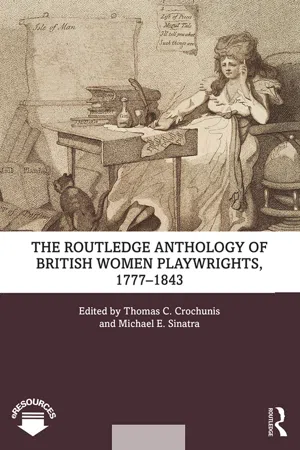1. Percy
Hannah More
Michael E. Sinatra
Hannah More was born at Fishponds, near Bristol, in 1745. Her father was a schoolmaster who believed in female education. Thus, More received an extensive education in Latin and mathematics. She started her literary career by writing for the stage. Her first play, The Search of Happiness, was staged in 1773. Through mutual friends, she met David Garrick, actor, playwright, producer, and manager of Drury Lane, like Covent Garden one of the only two licensed theatres in London at the time. Both Garrick and his wife Eva Marie made recommendations to More about her plays, with Garrick suggesting revisions and writing epilogues that set the themes and background of the play. The Garricks also advised More on her movement in London literary circles. Through their influence, she met Elizabeth Montagu, member of the Bluestocking Circle, a group that consisted mainly of educated women, although men such as Edmund Burke and Samuel Johnson also often joined their conversations on education and literature. Many of the noteworthy female authors of the Romantic era belonged to that circle: Anna Laetitia Barbauld, Catharine Macaulay, and Frances Burney, for instance.
Garrick’s influence on More’s writing for the theatre began with her second play The Inflexible Captive. After its closet publication in 1774, he was instrumental in its being staged successfully in Bath in 1775. Because More had doubts about the play’s dramatic effectiveness, she chose not to have the play staged in London, however, preferring to write a new play that would better reward Garrick for his efforts on her behalf. Percy was developed after Garrick retired from management of Drury Lane in 1776, and both he and his wife advised More on the play’s development. Critics have noted that rather than mark small changes on More’s fair copy, Garrick advised her on the structure of the play’s plot in letters exchanged during the play’s development, and More realized many of his suggestions in her revisions of the play.
Percy opened at Covent Garden in December 1777 and proved very successful, being performed 19 times in 1777–78, the most successful of the new plays staged that season. The play’s publication also earned More £150 from the sale of 4,000 copies. Percy was a success with both audiences and the critics. More herself, who watched several performances out of sight while seated in a stage box with Mrs. Garrick, observed the strong emotional responses audiences had to the play. Though an infrequent theatre patron, Elizabeth Montagu, after learning of the praise the play’s first night received, attended three performances in the first nine nights. Though a few noteworthy commentators – Richard Cumberland, ‘Peter Pindar,’ Horace Walpole, and Hester Thrale – were not enthusiastic, most reviews concurred with audience praise of the play. The play was revived in 1787 with Sarah Siddons as Elwina and again was reported to move audiences powerfully.
More’s last play for the public stage, The Fatal Falsehood, was produced just a few months after Garrick’s death in 1779. Though she had benefited from his advice before his death, the play was not well received by audiences or critics and was performed only three times that season. After Garrick’s death in 1779, More gave up writing for the stage, though she did write a number of religious plays on biblical themes, some collected as Sacred Dramas and published in 1782 and others included in her collected works. After giving up writing for the stage, More mainly devoted herself to writing poetry and didactic nonfiction. She wrote on abolition and in Village Politics voiced a critical reaction to Thomas Paine’s Rights of Man. In her series of Cheap Repository Tracts, More sought to educate readers on moral and religious matters, sometimes using dramatic dialogue to represent characters with opposing viewpoints. The Cheap Repository Tracts were a huge success, partly because of the formats used: in addition to sometimes using dialogue, the tracts imitated the lewd ballads sold in alehouses. In 1809, she published anonymously her only novel, Cœlebs in Search of a Wife, which was a huge success. More died in 1833.
More’s play is indebted to Dormont De Belloy’s Gabrielle de Vergy, a five-act verse tragedy produced in July 1777. Though she changed the setting and character names, More retained the Crusades as her play’s historical context. Even so, More made a number of subtle alterations in the story drawn from her sourc...
